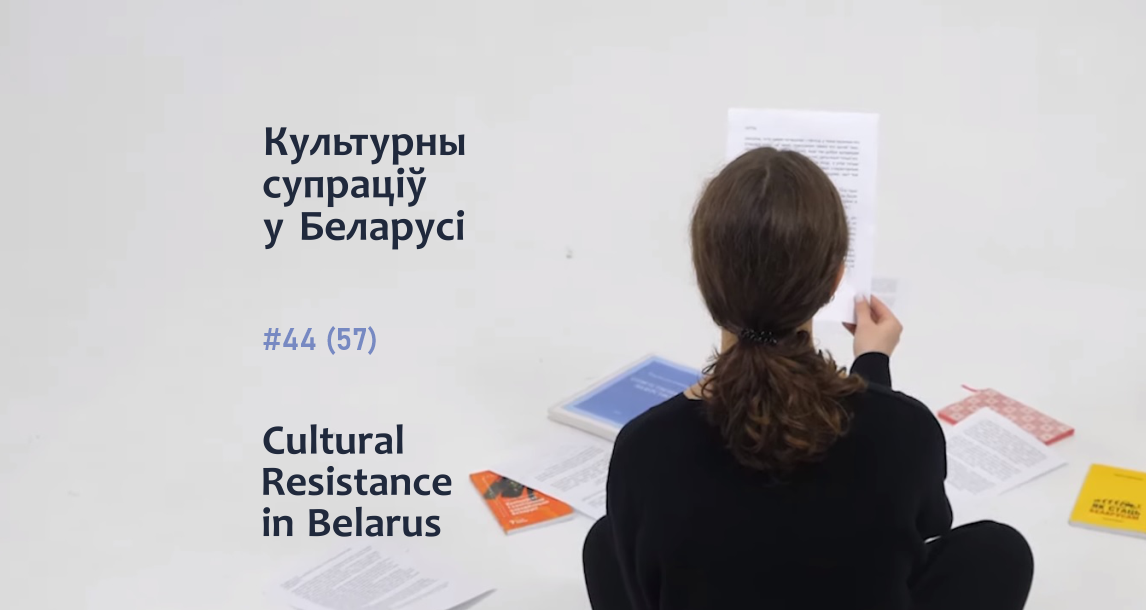
Download the pdf-version of issue 57 of Cultural Resistance Monitoring
Persecution, Convictions, Censorship, Cultural Policy
The Supreme Court of Belarus will consider liquidation of the Francysk Skaryna Belarusian Language Society on November 8.
Maksim Vałodzin, a composer and a citizen of Russia, who lived in Belarus for 22 years, has been deported.
“On October 4, I received two letters. One contained an invitation to the court hearing where they were to consider my case for deportation, and the other was the decision itself. I didn’t even have a chance to defend myself,”
Maksim comments.

The pressure on the lawyers of political prisoners continues. Alaksandr Biryłaŭ, the lawyer of Andrej Pačobut (essayist, publicist, poet, songwriter and musician, detained on March 25, 2021 for “inciting hatred”) received a message from the Ministry of Justice that his qualifications were “not fully in line with the law.” Biryłaŭ was given six months to comply with the commission’s recommendations, after which he will be re-tested for certification.
Eduard Babaryka, a political prisoner, cultural manager, and son of a philanthropist Viktar Babaryka, detained on June 18, 2020 for alleged tax evasion, was deprived of his lawyer. The Ministry of Justice has decided that Iryna Varankova “cannot perform her professional duties due to insufficient qualifications.”
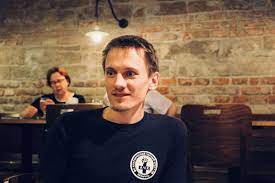
The prosecutor called for a five-year sentence for Mikoła Dziadok, a blogger and writer, detained on November 11, 2020. He was accused of organization and preparation of actions that grossly violate public order, or active participation in them as well as other articles. Mikoła did not agree with any part of the accusation.
Aksana Mankievič, a tour guide from Minsk, was arrested for 15 days for “disobedience to police officers.”
On November 4, the Ministry of Information of Belarus blocked the websites of several liquidated public associations. Among them are PEN Belarus, the Union of Belarusian Writers, and the National Committee of the International Council on Monuments and Sites (ICOMOS). The websites can be accessed in Belarus only using VPN.
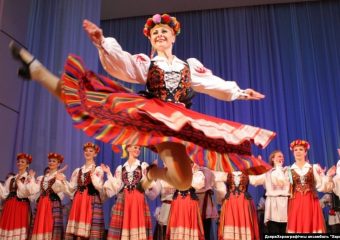
Dźmitry, a former musician of the State Philharmonic and State Folk Dance Company “Khoroshki”, fired in August 2021 for his political stance, told the details of his persecution. In August, during the search, about $ 7,500 were confiscated from him; only about $ 6,000 were registered in the documents. Dzmitry served 41 days of administrative arrest, went through tortures, and was threatened with arrest of his wife unless he agreed to cooperate. As soon as Dzmitry was released after signing a travel restrictions agreement, he was able to flee the country.
The film “Temptation” directed by Paul Verhoeven disappeared from the event guides of Minsk cinemas. The Republican Expert Commission for the Prevention of Propaganda of Pornography, Violence and Cruelty (REC) “does not recommend the picture to be shown in the country.” REC says it has received “numerous appeals from citizens” not to show the film in Belarus — there are only 30 names in that list.
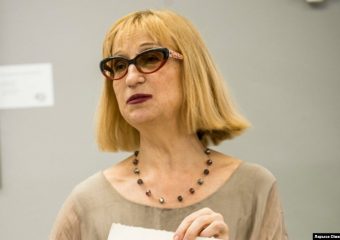
Łarysa Simakovič, a composer, member of the Belarusian Union of Composers, was fired from the National Philharmonic after her last premiere. She believes that one of the main reasons for her dismissal was her using the Belarusian language at work, because “the Belarusian language today marks a person’s stance”. Later PEN Belarus learned that the management of the Philharmonic had a list of 70 people to be fired for their political stance. PEN Belarus is verifying this information.
Aleś Puškin, artist accused of “deliberate actions aimed at rehabilitating and justifying Nazism” for painting a portrait of a Belarusian anti-Soviet partisan of the postwar period, had his detention extended until January 30, 2022. Recently in a letter from prison he wrote,
“Just for the love of art, the truth, I chose to go to prison instead of staying in Kyiv: for otherwise, who would believe me!”
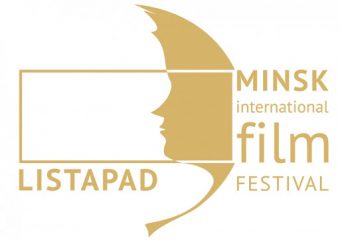 МThe International Federation of Film Producers Associations (FIAPF) has suspended the accreditation of the Listapad Film Festival due to the fact that “the accreditation of the Minsk Festival casts a shadow over other festivals to which we grant such an accreditation”. The festival is no longer international, because “people from the world of cinema understand that it is impossible to hold a large-scale event in a country where tens of thousands of activists are thrown in jail, fired, killed, that the festival organizer (Ministry of Culture this year) censors everything that still has a spark life in it and the festival’s information partner (Belarusian Television) shows abuse of political prisoners on air,” shared Siarhei Budkin, the head of the Belarusian Council for Culture.
МThe International Federation of Film Producers Associations (FIAPF) has suspended the accreditation of the Listapad Film Festival due to the fact that “the accreditation of the Minsk Festival casts a shadow over other festivals to which we grant such an accreditation”. The festival is no longer international, because “people from the world of cinema understand that it is impossible to hold a large-scale event in a country where tens of thousands of activists are thrown in jail, fired, killed, that the festival organizer (Ministry of Culture this year) censors everything that still has a spark life in it and the festival’s information partner (Belarusian Television) shows abuse of political prisoners on air,” shared Siarhei Budkin, the head of the Belarusian Council for Culture.
Life of the Imprisoned People

Ihar Bancer, political prisoner musician, was returned to the Viciebsk detention center from the open air prison. The administration of the open air prison decided that he had committed several violations, after which, despite Ihar having a fever, the musician was placed in a punitive confinement.
Julija Cimafiejeva, a poet, translator and writer, member of PEN Belarus, received letters from her brother, Piatro Marčanka, musician from the band Irdorath, and Julija Marčanka (Junickaja), his wife, who was detained together with him on August 2, 2021. Julia writes that she has got used to prison life.

“People ask if I sing here — no, I don’t want to sing at all.”
She reads a lot, hasn’t complained about her health. Piatro writes that three weeks ago they made a cake for his inmate’s birthday,
“Almost like a real cake.”
He is engaged in mathematics, studies books on programming, which he can find in the library of the pre-trial prison, and develops a textbook-application for bagpipers, which he started working on earlier.
Dissent and Cultural Activism
Aleś Kontra, an artist, decorated the city of Brest with a mural picturing a kestrel for the public organization “APB-BirdLife Belarus”.
Marharyta Laŭčuk with the “DJs of changes” made a cover of the legendary Viktar Tsoi’s song.
The first book trailer of the 10th anniversary season of the Jerzy Giedroyc Literary Award was released. It is for the shortlisted book Aquarium. A story of one youth by Siarhiej Kalenda.
The sixth of the twelve episodes of Homan, online courses in the Belarusian language, was released. The topic of this episode is house, apartment and furniture.

Siarhiej Doŭhušaŭ, Alaksiej Varsoba, Andrej Jeŭdakimaŭ (Isna Trio) performed at the Belarusian Church in Antwerp, Belgium. The concert was dedicated to the memory of Vitold Ašurak, a political prisoner who died in prison, and all those innocent people tortured and killed in Belarus.
The Union of Belarusian Writers shared Cimoch Akudovič’s initiative — “Dziady in the World.” The interactive map shows the exact burial places of Belarusians around the world and contains brief information about them.
Maksim Žbankoŭ’s collection of essays SloMo is now available in audio on the book service MyBook.
On November 4, Eliza Ažeška’s novel Two Poles was presented online. It was published in Belarusian under the title Savage by the publishing house Goliath.

Ivan Trus, a Belarusian actor who left the Janka Kupała National Theatre after the events of August 2020, won the most prestigious theater award in St. Petersburg “Golden Ceiling” in the “Best Actor in Drama Theater” nomination.
The VOKA video service has released a new version of the famous fairy-tale Cinderella in the Belarusian language.
Doctor Oy, a Belarusian artist, created a cute art object in Wroclaw.
The Belarusian fashion brand KANVA shared a folklore-feminine photoshoot with the elements of a traditional Belarusian women’s costume, in which Andruś Takindanh, TheHm and Artur Matviejenka, Belarusian musicians, took part.
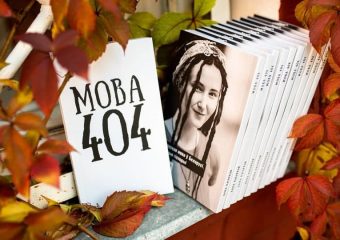 The book BELARUSIAN LANGUAGE 404 about discrimination of Belarusian-speaking people in Belarus, by Alina Nahornaja, a well-known language activist, has been published.
The book BELARUSIAN LANGUAGE 404 about discrimination of Belarusian-speaking people in Belarus, by Alina Nahornaja, a well-known language activist, has been published.
Mova Nanova courses in Vilnius made a class on traditional Belarusian singing.
PEN Belarus and Julija Arciomava, a prose writer, discussed her novel I am the Revolution, the history of her forced emigration and how it affected her work.
A new book Tolstoy and the Purple Chair by Nina Sankovič was released. It is about reading books by the daughter of a Belarusian emigrant.

The Haradski vał band dedicated a song to the Belarusian medical doctors.
A crowdfunding campaign has been launched for production of an audio book of the children’s poems written by Andrej Skurko, Belarusian political prisoner journalist, poet, author of children’s fairy-tales, magazines and comic strips, which he continues writing in prison for his son.The poems will be read by renowned Belarusian artists and produced with the help of the Bejbus project team.
A calendar with Belarusian words for each day of the year 2022 has been published by Danaryt publishing house in Minsk.
A book trailer for Siarhiej Abłamiejka’s book Kalinoŭski and the political birth of Belarus, shortlisted for Jerzy Giedroyc Literary Award 2021, has been released.
A concert of the Warszaw Freedom Orchestra, the first Belarusian orchestra in the Polish music space, took place in Warsaw on November 5. The orchestra consists of professional musicians who emigrated to Poland in different years, as well as those who left Belarus for political reasons.
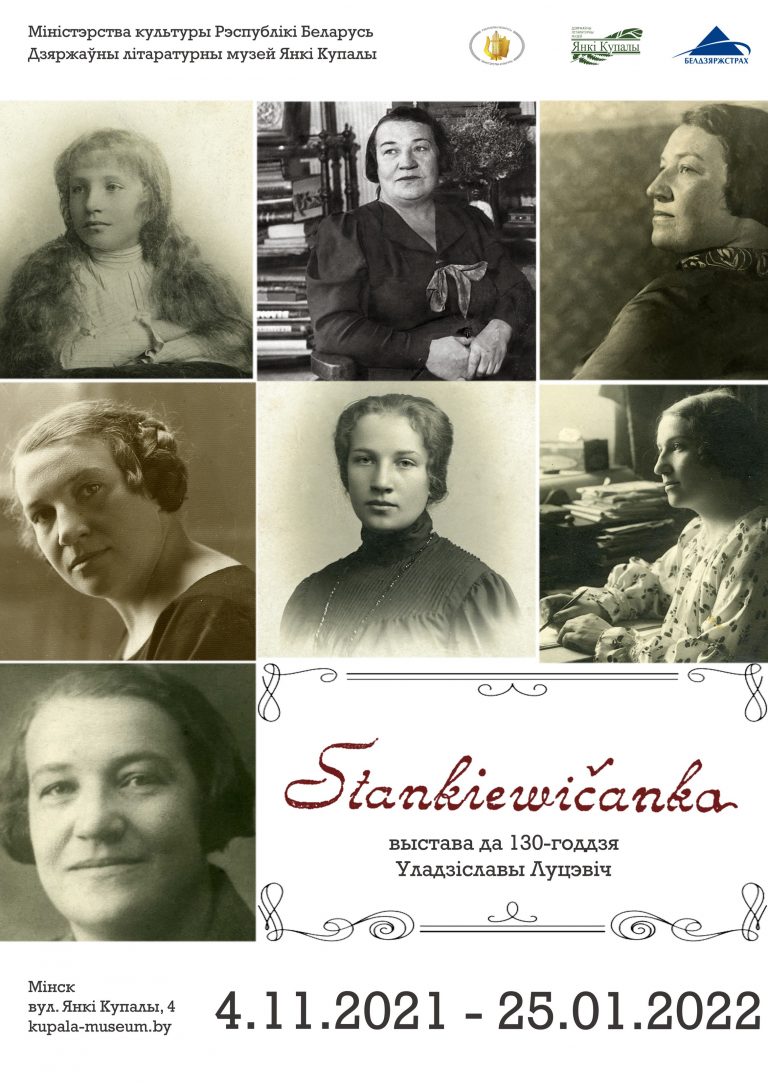
A postcard depicting a small part of the collection dedicated to Tadevušu Kaściuška (1746-1817), a national hero in Poland, Lithuania, Belarus, and the United States, was published. Ihar Fiedasienka from a Belarusian town of Ivacevičy has been collecting it for a long time.
The Janka Kupała State Literary Museum is organizing an exhibition Stankiewičanka for the 130th anniversary of Janka Kupała’s wife Uładzisłava Łucevič.
Marharyta Laŭčuk, Ivan Kirčuk and Siarhiej Doŭhušaŭ (TryNici project) presented a video for a folk song Carkoŭka (Church), which is traditionally sung on the Kupała night.
Portraits of Belarusian writers who continue their work behind the bars will appear on Radio Free Europe from November 5 to 15. The first person was Andrej Alaksandraŭ, journalist, media manager, poet. On November 15, the Day of Imprisoned Writer, Radio Svaboda and the PEN Belarus will announce the winners of the Francišak Aliachnovič Award, which was founded jointly with the Belarusian Service of Radio Liberty/Radio Free Europe in 2013, the award goes (not annually) to authors for the best work in any genre in Belarusian and Russian languages, written in prison.
On November 5, the media project Executed Poetry from the Free Belarus Center ended with a video by Dzianis Tarasienka, a musician from the RSP band, in which he read a poem by a Belarusian poet Julij Taŭbin executed on the night of October 29, 1937.
Artur Basak, a self-taught artist, programmer and UI engineer, creates images of famous demons from legends inspired by the Belarusian folklore and folk demonology.
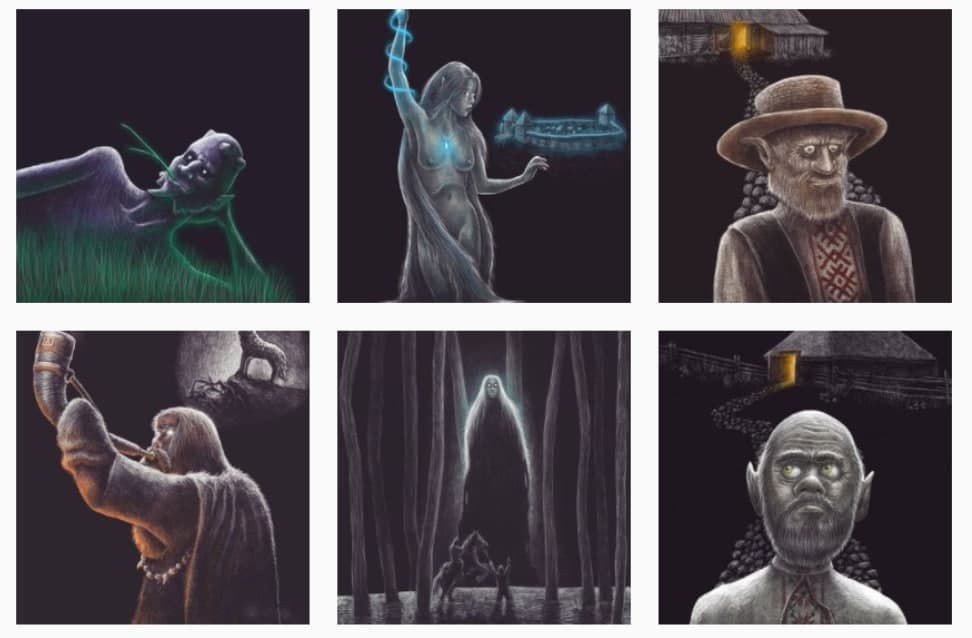
A photo exhibition Belarusians have a voice organized by the Belarusian diaspora has opened in Bialystok. The photos show what the Belarusians of the city accomplished over the past year to defend their civil position.
Voices of Belarusian Culture
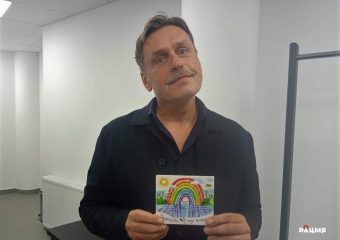
Zmicier Vajciuškievič, a musician and singer, told Radio Racyja that it is currently impossible for him to organize a concert in Belarus,
“Cultural life is in hiding now. Some people do something. Previously, there were some information channels through which you could learn such information <...>. Now it is passed from mouth to mouth as in the old days. <...> But how is it possible to forbid writing poetry or thinking under these circumstances? People still reflect somehow on what is happening.”
Kaciaryna Andrejeva, a journalist and writer, spent almost the entire 28th year of her life behind bars. On her birthday on November 2, media recall a quote from her letters,
“I don’t regret anything I’ve gone through. My zest for life cannot be disrupted by any prison.”
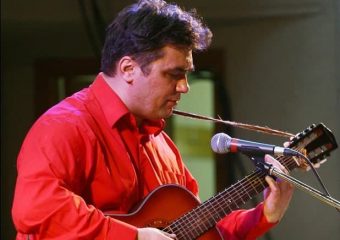
Zmicier Bartosik, a bard, writer and journalist, told about his path of formation,
“Once a foreigner, I was not biased that the Belarusian language is the language of the collective farm also known as kolkhoz. On the contrary, not yet fully aware, not being able to formulate this idea, in my heart I realized how cool and interesting the Belarusian language is, how figurative it is.”
Artur Klinaŭ, writer, artist and architect, told about the hidden life of Belarusians and his novel Łokisaŭ about the events of 2020,
“It is almost a scientific fact that every Belarusian has a double life. To one degree or another, it is actually a tradition of these people that comes from the same place as partisans. You know, for several centuries people had to survive in very unfavorable conditions. And when I wrote Łokisaŭ, I wanted to elaborate on this topic: a double identity, a person with a secret life — to this or that extent each of us is such a person.”
Arciom Šyškoŭ, a Belarusian who is called one of the best violinists in the world, gave an interview about his vision of hope for change after the protests became quieter but the officials did not stop terror and repression,
“People protest for peace, they do not want any blood.”

In her letters, Maryja Bidula told Viktar Babaryka, a political prisoner and philanthropist, that many artists refused to take part in the autumn exhibitions because it would demonstrate that things went back to normal. She asked how Viktar perceived this issue. This week she received a response dated October 24, 2021,
“I was taught once that all people need fresh air and praise. When fresh air disappears, praise can not remain your motivation. If your art pieces are rejected by exhibitions because of their relevance and truth, you can not exhibit “comfortable” art for “sweets” and awards. It is the duty of a creative person to be honest with the audience. Therefore it is necessary to always take part in exhibitions whatever the circumstances are, but only with art that is true to your soul. The feeling of guilt for betraying one’s talent out of fear is bigger than continuing to live your life when someone else is suffering. ‘I was then with my people where my people, unfortunately, were.’ One can not explain the mission of creators better. That is why the Kupałaŭcy left the Janka Kupała National Theatre, but did not cease to be actors and directors. One should not confuse institutions and people. You should not work in a specific corrupted organisation, but you have to work and create”.
In his last words at the trial, Mikoła Dziadok, a blogger and writer, detained on November 11, 2020, thanked his relatives, friends, journalists, and human rights activists for their work and support.
“And to everyone involved in the political processes in my country, I want to say, ‘Forget your illusions. No documents written by you, no terror will stop development and progress. We will win anyway!”
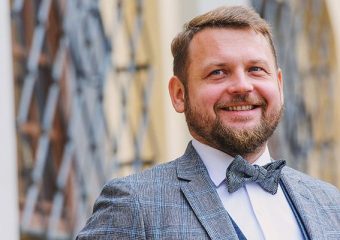
Alaksandr Čachoŭski, Executive Director of the Belarusian Council For Culture, reflected on successful creators who are “out of politics” and “artists of victory”,
“Artists are the heavy cavalry of our resistance. We see how they have grown along with the protest as creators, as there has been a demand from the public for their own [authentic culture]. It is necessary to show the real Belarusian culture, not its “propaganda” face, to the world.”
International Solidarity
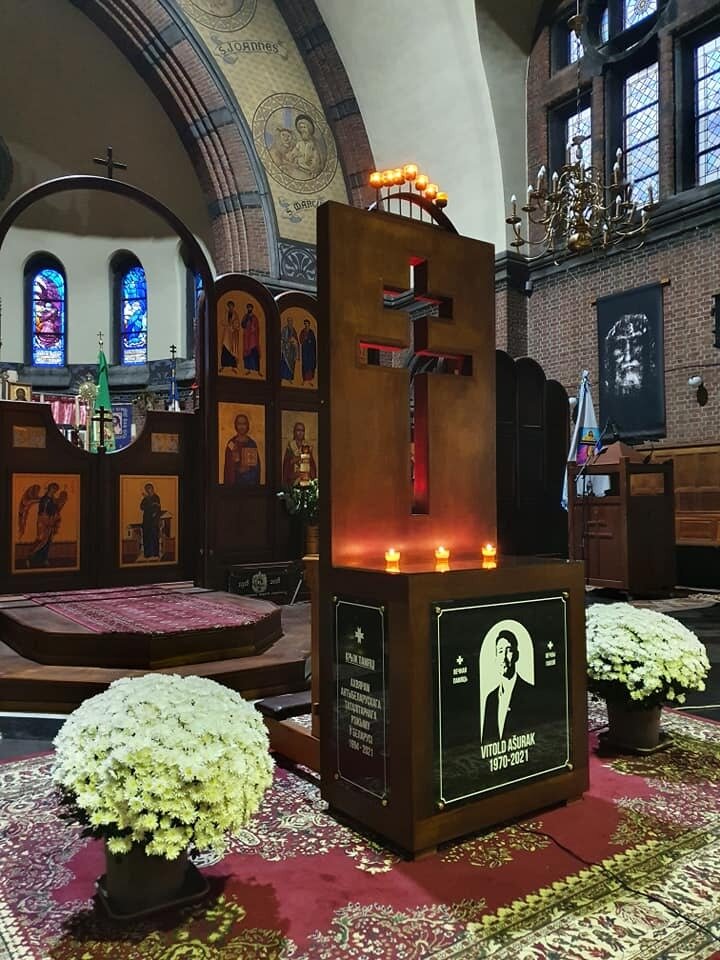
A memorial sign dedicated to Vitold Ašurak, a political prisoner who died in the Škłoŭ penal colony, has been erected in Belgium.
A german online store Merch Piratin started selling stickers, T-shirts and badges with the #freeIrdorath logo. Proceeds from the sale will be used to support the imprisoned musicians from the Irdorath band and their families.
Belarusian women are taking part in a new collaborative project Voice of Women (VOW) — My Step to Freedom, organized by the Belarus Women’s Foundation and a Scottish artist Karis Knight.
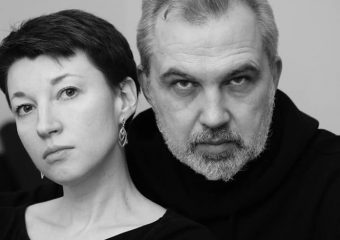
Julia Cimafejeva and Alhierd Bacharevič, internationally renowned Belarusian authors, gave a talk about history, language, literature, and politics at University of Amsterdam, as well as read their work. Julia Cimafejeva also had a reading at Paradiso Amsterdam.
Belarusian diaspora in Brazil organized a letter writing campaign to Belarusian political prisoners. Among others, postcards were signed for Kasia Budźko, a student, artist, imprisoned for 2,5 years.
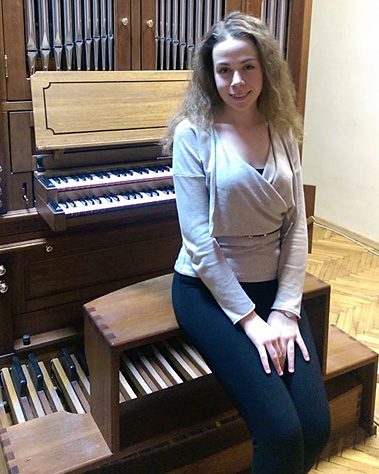
A concert of Maryna Pinčukova, an organist and conductor, a student of the Academy of Music in Basel, and Arciom Šyškoŭ, a virtuoso violinist, took place in Switzerland. During the people could donate to help the BYHome project of the Belarusian-Swiss association RAZAM.CH, which supports families forced to flee political persecution from Belarus to Poland, as well as #MusicForBelarus — a movement of musicians around the world in support of Belarusian political prisoners.
The Association of Belarusians of Paris (Communauté des Bélarusses à Paris) sent a letter from Belarusians in France to the UNESCO headquarters about the repressions of Łukašenka’s regime against Belarusian cultural figures. The purpose of the letter is to put pressure on international organizations and businesses to stop cooperating with the regime, which continues to destroy Belarusian culture. Among the signatories is Svetlana Alexievich, a Belarusian Nobel Prize laureate in literature.
Political Prisoners’ Birthdays
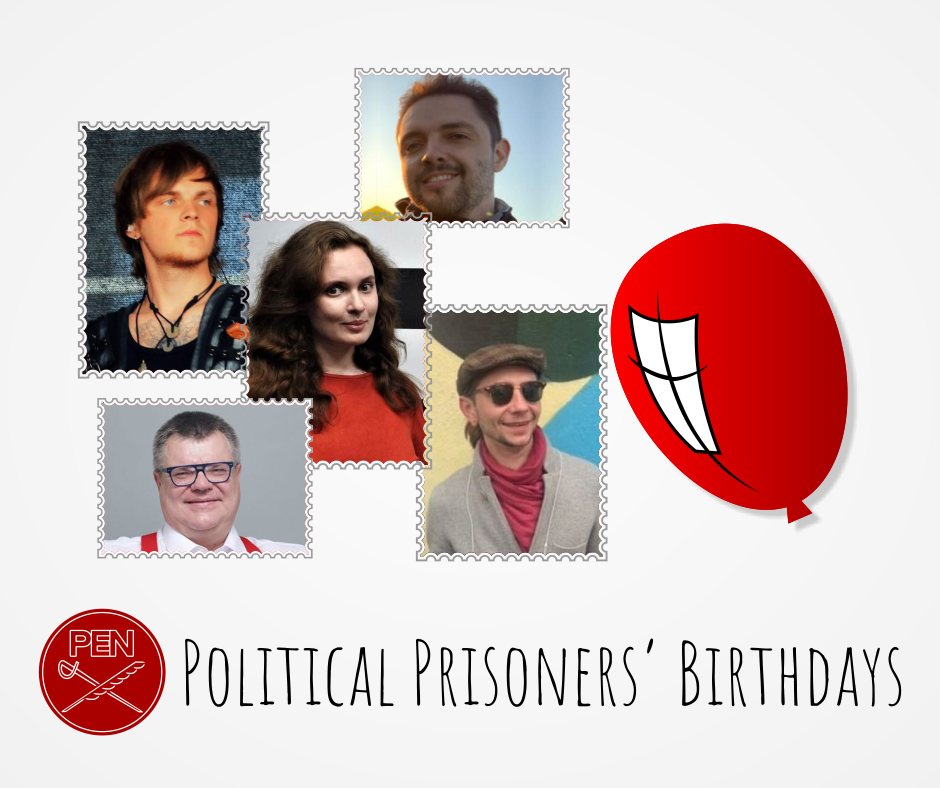
For November 7, 834 persons have been recognized as political prisoners in Belarus, and the number has been increasing steadily. This, of course, shows that repression by the authorities not just hasn’t stopped, but is actually gaining strength.
PEN Belarus, as an association of writers, is particularly concerned about the fate of cultural workers who have been unjustly imprisoned.
In November, 5 political prisoners somehow involved in the process of cultural development of our country, will celebrate their birthdays behind bars. They are:
Anton Šnip, musician (November 1); Kaciaryna Andrejeva, journalist, writer (November 2); Viktar Babaryka, patron of arts (November 9); Ihar Jarmołaŭ, dancer (November 15) and Maksim Kruk, scene designer (November 16).
Letters and postcards (in Belarusian or Russian) can be sent to the following address:
Anton Šnip (Антон Шніп) and Maksim Kruk (Максім Крук): СІЗА-1. 220030, г. Мінск, вул. Валадарскага, 2;
Kaciaryna Andrejeva (Кацярына Андрэева): ПК №4. 246035, г. Гомель, вул. Антошкіна, 3;
Viktar Babaryka (Віктар Бабарыка): ПК №1. 211440, г. Наваполацк, вул. Тэхнічная, 8;
Ihar Jarmołaŭ (Ігар Ярмолаў): ПК №17. 213004, г. Шклоў, вул. 1-я Заводская, 8.
